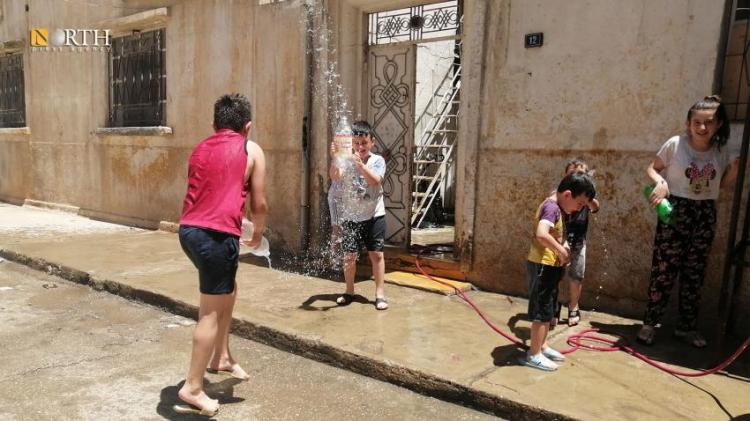Syriac Orthodox Church celebrates Pentecost in Qamishli, Syria
Reem Chamoun
QAMISHLI, Syria (North Press) – Syriac Orthodox churches in the city of Qamishli celebrated Pentecost Mass on Sunday, which marks the coming of the Holy Spirit to the 12 disciples of Christ. Pentecost also called the Whitsunday.
According to Christian beliefs, this day goes back to the first Gregorian year, where Christ pledged to His disciples the coming of the Holy Spirit upon them, so the disciples with the presence of the Virgin Mary and other women waited for the Holy Spirit to come upon them inside the attic in Jerusalem on the seventh Sunday after the Resurrection of Jesus. This is what the priest of Virgin Mary Church in Qamishli Abdul-Masih Youssef told North Press regarding the reason for the ocassion.
Youssef said that before the coming of the Holy Spirit to the disciples, the message that Jesus assigned was not clear to them, as they considered all subjects as material and were just simple fishermen. But as the spirit came upon them on this day, he gave them ability, knowledge and power to spread the message of Christ, or the message of salvation.
“This celebration has special rituals where the priest blesses the water to sanctify it, as this ritual has its own prayers, and then he sprays those inside the church with drops of holy water,” he said.
“The water symbolizes the Holy Spirit when it came to the disciples and the Virgin Mary, when it had come in the form of flames. We likened water droplets to the flames,” Youssef added.
The rituals of spraying water are not limited to those inside the church or only to the clergy. It was also seen in residential neighborhoods and spread among children especially, and children express their joy on this holiday by playing in the water and spraying it on some of them, or on passersby in the neighborhood they are in.
The priest explained that this phenomenon has nothing to do with the Pentecost, saying: “There are some customs that have been practiced outside the church in the past five decades. They have nothing to do with the rituals of the church. Rather, they are hereditary social habits, because the prayers were not performed on it.”
The priest of hopes that “peace and joy will return to the hearts of all believers on this day” and that “the Holy Spirit will come upon all those who attended this feast and those who could not attend it”, adding that “he who does not live in peace cannot give peace to others, and we invite all human beings for peace.”
On Saturday, the Syriac Orthodox Church in Qamishli issued a statement calling for the opening of the churches completely from Sunday and holding all rituals and religious ceremonies taking into account preventative measures according to the instructions of the concerned authorities in order to ensure public safety.
In the middle of last March, the Church decided to cancel all its meetings and celebrations, stop prayers and Masses in churches, and limit funerals to parish priests to prevent the threat of coronavirus.

